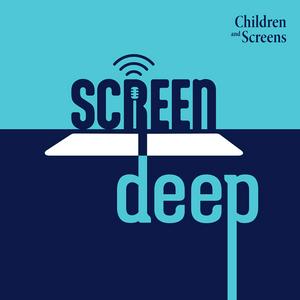28 episodes
- AI “friends” and companions are increasingly providing children and adolescents with social interactions and perceived “relationships,” despite being a technology that itself has no need for empathy or emotional reciprocity. What are the costs of attachment to these AI products to children and adolescents’ social skill development?
On this episode of Screen Deep, host Kris Perry is joined by Dr. Pilyoung Kim, Professor in the Department of Psychology at the University of Denver and the Director of the Brain, Artificial Intelligence, and Child Center. A developmental psychologist with a background studying child brain development and early relationships, Dr. Kim recently pivoted her work to focus on these pertinent questions about the effects of children socializing with AI products. Dr. Kim describes her research examining children’s responses to different types of AI systems, explains what makes certain children more vulnerable to developing problematic attachments to chatbots, and suggests better product design approaches to minimize harm while facilitating helpful uses.
In this episode, you will learn:
What makes AI chatbots feel “human” to kids and why that matters
Which children are more vulnerable to forming strong attachments to AI “best friends” — and the hidden costs of constant interaction with unconditionally supportive AI tools
Why children who are still developing their understanding of relationships and appropriate boundaries may be at risk from human-like AI companions
How proactive design changes could make AI companions safer for youth to use
What parents and caregivers can do to help children and adolescents navigate AI companions more safely
What researchers urgently need to study next to identify and support youth most at risk of overattachment to AI chatbots
For more resources and research on this topic visit the Learn and Explore section of the Children and Screens website (https://www.childrenandscreens.org)
--------------
Follow Children and Screens on:
Facebook: Children and Screens: Institute of Digital Media and Child Development
Instagram: @childrenandscreens
LinkedIn: Children and Screens: Institute of Digital Media and Child Development
X: @childrenscreens
Bluesky: @childrenandscreens.bsky.social
---------------
Music: 'Life in Silico' by Scott Buckley - released under CC-BY 4.0. www.scottbuckley.com.au - Schools are increasingly deploying AI-powered technologies in classrooms that promise to revolutionize education, yet there is growing concern over the risks to children and adolescents’ learning by doing so. What do children, adolescents, and teachers think about how AI is being used in the classroom, and do these technologies actually impact learning and key cognitive skill development? In this episode of Screen Deep, host Kris Perry explores these questions with educational technology expert Dr. Adam Dubé, Associate Professor of Learning Sciences at McGill University. Dr. Dubé describes his research on how youth and educators view AI, key pitfalls to avoid when using AI for learning, and how past lessons from introducing technologies can inform the way we think about educational AI. He shares what parents need to know about selecting a good educational app for their children, and how to make informed decisions about utilizing technology to enhance, not replace, the learning process.
In this episode, you will learn:
How relying on AI for task completion can interfere with the development of fundamental skills like creativity and detailed reading.
Simple questions educators and students can ask to determine if AI use is offloading thinking or supporting learning.
How teachers’ opinions of AI use in the classroom have changed over time and what’s causing growing concern.
What is needed for more thoughtful integration of AI into classrooms.
How to identify a quality educational app and why parents often overlook those features when selecting digital apps for children.
For more resources and research on this topic visit the Learn and Explore section of the Children and Screens website (https://www.childrenandscreens.org)
--------------
Follow Children and Screens on:
Facebook: Children and Screens: Institute of Digital Media and Child Development
Instagram: @childrenandscreens
LinkedIn: Children and Screens: Institute of Digital Media and Child Development
X: @childrenscreens
Bluesky: @childrenandscreens.bsky.social
---------------
Music: 'Life in Silico' by Scott Buckley - released under CC-BY 4.0. www.scottbuckley.com.au Are You Real? Ethics of AI Chatbots and Characters for Children with Sonia Tiwari, PhD
12/31/2025 | 51 mins.Children are increasingly encountering AI characters for both educational and entertainment purposes, but many of the chatbots and other AI products they interact with are not designed with child development and safety in mind. On this episode of Screen Deep, host Kris Perry pulls back the curtain on AI and child-centered design with Dr. Sonia Tiwari, a children’s media researcher and AI design expert. Drawing on her experience in game character design and her work bridging industry and academia, Dr. Tiwari explores how children think about and are drawn to AI characters, why AI products commonly used by children and adolescents today often fail at prioritizing child development, and the primary risks of child interactions with AI characters. She also offers insights on how products can be better designed to meet children’s and families’ needs, and what kinds of uses of AI characters might be helpful for children.
In this episode, you will learn:
How AI characters are experienced differently than traditional media characters – and why it matters for children and adolescents.
Why the developing brains of younger children have a more difficult time understanding the fictional nature of today’s AI characters.
What defines a child-appropriate AI character grounded in developmental science.
How parents and caregivers can use AI characters with children in purpose-driven and healthy ways.
What social AI platform developers should consider to ensure their products are more ethically designed and centered on children’s developmental needs.
For more resources and research on this topic visit the Learn and Explore section of the Children and Screens website (https://www.childrenandscreens.org)
--------------
Follow Children and Screens on:
Facebook: Children and Screens: Institute of Digital Media and Child Development
Instagram: @childrenandscreens
LinkedIn: Children and Screens: Institute of Digital Media and Child Development
X: @childrenscreens
Bluesky: @childrenandscreens.bsky.social
---------------
Music: 'Life in Silico' by Scott Buckley - released under CC-BY 4.0. www.scottbuckley.com.au- What is the social cost of looking at your phone when in the company of other people? Is smartphone and social media use making us less connected, more lonely, and addicted to the endless videos on our feed? On this episode of Screen Deep, host Kris Perry discusses the ways people are becoming more attached to their phones and less connected to others with Dr. Meredith David, Associate Professor of Marketing at Baylor University. Drawing on her diverse portfolio of research, Dr. David shares evidence on how social media use contributes to feelings of loneliness and FOMO, how design features of popular short form video platforms facilitate addictive behaviors, and how “phubbing” – phone-snubbing – negatively impacts a myriad of social relationships.
In this episode, you will learn:
What a nine year study shows about how social media use and loneliness influence each other.
How a “negative cycle” can form between people using their phones in front of each other, reinforcing more phone use in front of others.
What a consensus study from more than 120 leading researchers says about social media, sleep, and attention.
Why short-form video platforms are so addictive – and which platform is designed to be the most addictive to use.
How excessive use of short-form video platforms affects self-control and contributes to what many people call “brain rot.”
For more resources and research on this topic visit the Learn and Explore section of the Children and Screens website (https://www.childrenandscreens.org)
--------------
Follow Children and Screens on:
Facebook: Children and Screens: Institute of Digital Media and Child Development
Instagram: @childrenandscreens
LinkedIn: Children and Screens: Institute of Digital Media and Child Development
X: @childrenscreens
Bluesky: @childrenandscreens.bsky.social
---------------
Music: 'Life in Silico' by Scott Buckley - released under CC-BY 4.0. www.scottbuckley.com.au - A child’s first smartphone is a modern "rite of passage" and today's parents face a challenging decision – when is the right time? Peer pressure and fear of missing out loom heavily, yet there are significant risks to introducing a smart device before a child is ready. On this episode of Screen Deep, host Kris Perry talks with psychologist and creator of iParent101, Dr. Adam Pletter, about developmental readiness and practical steps for safely introducing a “pocket-sized computer” that allows access to the entirety of the internet. Drawing on his clinical experience and work with both parents and adolescents, Dr. Pletter describes the signs parents can look for to determine whether a child is ready for a smart device, the benefits of parental controls and family communication, and what to do if a child was given access before they were ready.
In this episode, you will learn:
How to spot the signs that a child may be able to handle the responsibility of smartphone ownership.
Why parents and caregivers should plan ahead for adult content exposure when considering the introduction of a smartphone.
How easing into personal device ownership with a less-connected “dumb” device is often helpful to prepare children for full smartphone access.
Strategies to navigate conflict around child smartphone ownership and media use.
How to advocate for safer smartphone design that defaults to child safety and privacy.
Why parental controls and family media plans should be part of an evolving and collaborative conversation with kids around screen use.
For more resources and research on this topic visit the Learn and Explore section of the Children and Screens website (https://www.childrenandscreens.org)
--------------
Follow Children and Screens on:
Facebook: Children and Screens: Institute of Digital Media and Child Development
Instagram: @childrenandscreens
LinkedIn: Children and Screens: Institute of Digital Media and Child Development
X: @childrenscreens
Bluesky: @childrenandscreens.bsky.social
---------------
Music: 'Life in Silico' by Scott Buckley - released under CC-BY 4.0. www.scottbuckley.com.au
More Education podcasts
Trending Education podcasts
About Screen Deep
Screen Deep takes aim at decoding young brains and behavior in a digital world. Host Kris Perry dives deep with a leading expert in each episode to explore how children and adolescents are affected mentally, physically, and developmentally by digital media use, bringing research and evidence-based perspectives to the essential questions on how to help children thrive today.
Podcast websiteListen to Screen Deep, Life Kit and many other podcasts from around the world with the radio.net app

Get the free radio.net app
- Stations and podcasts to bookmark
- Stream via Wi-Fi or Bluetooth
- Supports Carplay & Android Auto
- Many other app features
Get the free radio.net app
- Stations and podcasts to bookmark
- Stream via Wi-Fi or Bluetooth
- Supports Carplay & Android Auto
- Many other app features


Screen Deep
Scan code,
download the app,
start listening.
download the app,
start listening.








































